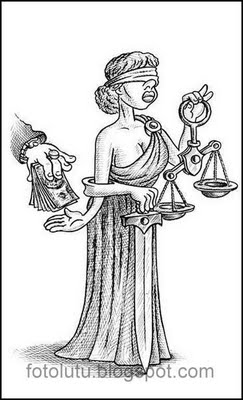In pre-colonial times, the law in most areas of what is now Indonesia was doled out at the whim of the local ruler. Then along came the Dutch: they imposed several overlapping legal systems. Dutch law, with trained judges and prosecutors operating under a clear legal code, applied to Europeans (who from 1899 included the Japanese as well as “gazetted Europeans”: favoured “natives” whose names were published in the government gazette). Indigenous islanders were subject to local courts staffed by untrained clerks for criminal matters; for cases relating to the family, marriage, inheritance and much else they were judged either under religious law or according to local and ill-defined “adat” or traditional law. The religious law was of course mostly sharia law, which itself enshrines the idea that some people’s word (men’s, mostly) counts for more than other people’s. “Foreign Orientals” — Chinese and Arabs mostly — went to European courts for business-related cases, and local courts for everything else. In short, the concept of equality before the law simply did not exist.
Though Indonesians have governed themselves as an independent nation for 70 years, inequality in the face of the law seems still to be the norm. A couple of recent cases have underlined that in pretty upsetting ways. One: a woman has been jailed because in a private Facebook chat she told a friend that her husband was abusing her. Her husband, snooping around in her private correspondence (itself a pretty good indicator of abuse) found the comments and reported his wife to the police. Did the police investigate him for invasion of privacy? No. Did they try to find out whether the allegations were true and provide any kind of protection for the woman? No. They helped prepare a defamation case which has landed the woman in jail. While that tells us something general about how men’s word is valued over women’s it also tells us something about the absurdity of Indonesia’s legal system.
The other deeply dispiriting case of the last few weeks has been the 10 year jail sentence handed down to two school employees (Neil Bantleman, a Canadian, and Ferdinand Tjiong, an Indonesian) for allegedly sodomising three schoolboys with the help of a magic stone and some disappearing dungeons. The mother of one of the boys, who was also involved in an earlier case at the same school, is demanding US$125 million in damages. She seems vindicated in her belief that Indonesian judges would believe the children’s Harry Potter fantasy as long as the accused were the sort of push-button villains that Indonesian courts like to demonise. Right now, expatriates working in Indonesia seem to fall into that category. (For many other examples, mostly from the business sphere, see Ari Sharp’s book Risky Business.) The poor and less educated make good villains, too. In the earlier case, also at Jakarta International School (now renamed Jakarta Intercultural School) six janitors were accused of abusing Magic Stone Boy, then five years old. The five janitors that did not die during questioning in police custody are now in jail. The police say the sixth man committed suicide; they did not explain how or why he bruised his own face before killing himself during a break in questioning.
I think that children’s voices should be heard in court. I think that allegations of abuse should be taken seriously. But when medical reports, virology and the early testimony of the children themselves all point to no abuse, we should follow the evidence and common sense. Hard, in this case, since the trial was held in secret, the accused were subjected to gag orders, and the judge set arbitrary time limits on questioning of defence witnesses (though prosecution witnesses were given all the time they needed). It’s hardly surprising that commentators on news of the verdict are happy to believe widespread rumours that the accusations, the evidence-free convictions and and the huge compensation claims are all part of an orchestrated campaign to shut down the school and grab the valuable campus land.
I’m depressed that the judge couldn’t even be arsed to introduce any logic into her ruling. She listed six factors that pushed her to hand down 10 year sentences. I quote from Tempo:
First, the defendant never admit the harassment act that he committed. Second, the defendant never stated that he regretted his act. Third, the defendant never apologized to the victims’ family for what he had committed. Fourth, the defendant is considered to be uncooperative during the trial by giving convoluted statement in the court. Fifth, the defendant formed a public opinion by giving explanation about the case to the press, before and after the trial, whereas the trial is actually a closed hearing… And finally, the sixth, Bantleman was seen as a worst example of a professional teacher by burdening his students with psychological burden instead of protecting them.
In other words, the (foreign) defendant MUST be guilty because he maintains his innocence.
On recent evidence, women, foreigners and the 110 million Indonesians who live on two dollars a day can’t be blamed for thinking that not everyone is equal in the eyes of the law in Indonesia.






These six factors are perfectly legitimate matters for a judge to have regard to at the sentencing stage. It appears that you are misrepresenting the comments to be a rationale of why the defendant was found guilty.
In most countries, including USA and Australia defendants will face stiffer penalties if they plead not guilty and are found guilty. They will face stiffer penalties again if they breach suppression orders and the like. There is NOTHING about those matters which is somehow bizarre or even peculiar to Indonesia.
Greg. If you examine the evidence that was accepted by this judge, then it is difficult for any reasonable person to accept this verdict.
Here are 5 reasons why I am convinced that the verdict is wrong.
1. The location of the alleged assaults was in a public space. The police tried to speak of there being a ‘secret room’; however, they were seen on CCTV camera being shown by one of the victims where the assault took place. Watch this clip – https://www.youtube.com/watch?v=ZaDvrPsqs-s It would be impossible to commit multiple assaults in such a visible, high traffic, location.
2. The police said the accused produced a ‘magic stone’ from the air and inserted it into the child so that the child would not feel pain when raped. This stone was never produced. The judge accepted this explanation.
3. The only medical examinations that found signs of abuse were at the Police Hospital in Jakarta. The children were examined in other hospitals, including one in Singapore. These places found no evidence of rape. Consider the physical damage that multiple rapes would do to 5-6 yr old boys. The court rejected the medical evidence of all the hospitals bar the police hospital.
4. The boys attended school during and after the times of the alleged rapes (the police never specified an exact date for the rapes; rather, they said the rapes occured over a period of many months), At no time during those months did the children show any physical or emotional distress or fear about being at school. They were captured on film and in images being happy and playful at school. All of this evidence was ignored by the court.
5. Expert peer reviewed expert psychologists (I think one was from Oxford University) were called by the school to talk about the best practice methods to interview children about suspected sex abuse. A lot of these methods arose after the fiasco in the USA of the McMartin Trials in the 1980s. Their testimony was ignored by the court, who accepted the evidence from the local psychologists – including one who claimed that the fact that Bantleman only had sex with his wife once a week was a possible explanation for sodomising little boys. His ‘rationale’ was that normal men needed to have sex 2-3 times a week, and he would be seeking a ‘release’.
Greg,… basically you are saying that If I state I am not guilty and am not guilty regardless of this verdict then I am to blame for the sentence. It is more the judge looking for you to plead guilty and she is offended you have not done so even though you are right . She did not state any proof to find the person guilty. In fact it was her prosecutor who she allowed to speak publically about the trial.
This is all about monies behind the scenes